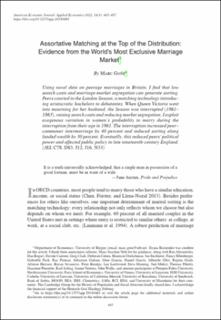Assortative Matching at the Top of the Distribution: Evidence from the World’s Most Exclusive Marriage Market
Journal article, Peer reviewed
Published version

Åpne
Permanent lenke
https://hdl.handle.net/11250/3061780Utgivelsesdato
2022Metadata
Vis full innførselSamlinger
- Department of Economics [287]
- Registrations from Cristin [9489]
Originalversjon
American economic journal. Applied economics. 2022, 14 (3), 445-487. 10.1257/app.20180463Sammendrag
Using novel data on peerage marriages in Britain, I find that low search costs and marriage-market segregation can generate sorting. Peers courted in the London Season, a matching technology introducing aristocratic bachelors to debutantes. When Queen Victoria went into mourning for her husband, the Season was interrupted (1861–1863), raising search costs and reducing market segregation. I exploit exogenous variation in women's probability to marry during the interruption from their age in 1861. The interruption increased peer-commoner intermarriage by 40 percent and reduced sorting along landed wealth by 30 percent. Eventually, this reduced peers' political power and affected public policy in late nineteenth-century England.